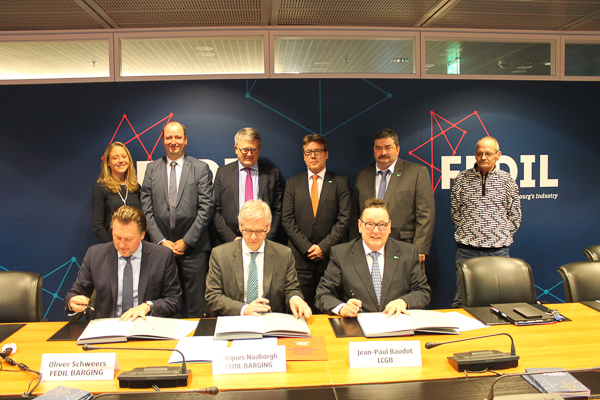
An inter-professional agreement on the organisation of working time in the inland navigation sector has been signed between the LCGB and OGBL unions and by the FEDIL Barging association.
The agreement is the culmination of negotiations with a view to the transposition of EU directive EU Directive 2014/112 / EU of 19 December 2014 implementing the European Agreement concerning certain aspects of the organisation of working time in inland waterway transport, concluded by the European Barge Union (EBU), the European Skippers Organisation (ESO) and the European Transport Workers’ Federation (ETWF).
The Directive aims to guarantee workers in inland navigation a high level of protection at work, in particular by introducing limitations on maximum working hours and minimum safety standards.
Indeed, as a mode of international transport, inland navigation is characterised mainly by cross-border activities. Many boats sail continuously, that is to say 24 hours a day.
Since workers can also stay or live on the vessels on which they work, it is quite common for them to also spend their rest periods there. Many workers in the inland navigation sector, particularly those away from their place of work, work several consecutive days on board and then spend several days at home or at any other place of their choice. Their average working time also includes a significant amount of on-call time (especially related to unpredictable waiting times at lock-outs or loading and unloading of the vessel).
Consequently, the time spent by these workers cannot be fully assimilated to working time and therefore the ceilings for daily and weekly working time may be higher than in other areas. General standards for working time do not sufficiently take these characteristics into account, and inland waterway transport undertakings are excluded from the scope of the relevant provisions of the Labour Code. Thus more specific requirements were necessary in order to limit the duration of work on board.
In a sector that is essentially cross-border, it is essential to guarantee workers an identically high level of social protection across all the Member States of the Union, which is why the social partners at European level have been identified as the best-placed to define these requirements. For example, the European Union of Inland Navigation (UENF), the European Organisation of Boat Workers (EPO) and the European Federation of Transport Workers (ETF) concluded on 15 February 2012 a European agreement on certain aspects of ship- The development of working time in the inland navigation sector, which was subsequently adopted by a Directive 2014/112 / EU of 19 December 2014.
In order to implement the directive, trade unions and employers' organisations at national level who are confronted on a day-to-day basis with the realities of the field and who know better than anyone else the specificities and constraints on board and the different models of the organisation of the working hours practiced, had recourse to the faculty conferred on them by Article L. 1651 of the Labour Code to conclude agreements to implement Directives, in particular Directives based on the agreement of the social partners at European level.
The inter-trade agreement agreed between the OGBL and LCGB trade unions with FEDIL Barging is the culmination of nearly a year of negotiations and aims to guarantee workers in inland navigation a high level of protection at work.
The agreement was signed yesterday, on 22 March 2017, in the presence of Mr Nicolas Schmit, Minister of Labour, Employment and Economy, by Jean Paul Baudot (LCGB) and Hubert Hollerich (OGBL), on one side, and By FEDIL Barging, represented by its chairman, Mr Jacques Naaborgh (Chemgas Barging S.a.r.l.), and Vice-President, Mr. Oliver Schweers (Imperial Shipping GmbH), on the other side.
This statement was produced by FEDIL Barging.








